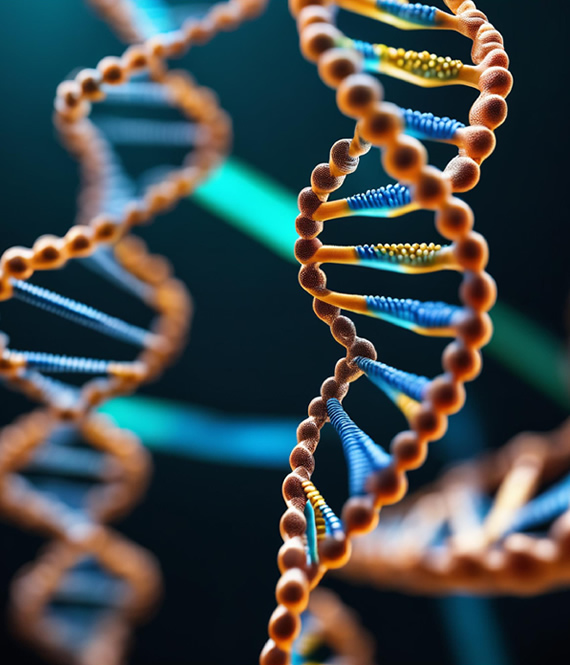
The Role of Biomarkers in Clinical Trials and Research
We recommend helpful products in our articles. Read our full disclosure here. The content on this website is not intended to be a substitute for professional advice, diagnosis, or treatment.
Clinical trials are vital to testing the safety and effectiveness of potential therapies, but did you know that biomarkers play a crucial role in these trials?
Biomarkers can help researchers identify suitable study patients, track disease progression, and measure treatment response.
In this article, we’ll explore the importance of biomarkers in clinical research and how they’re being used to improve patient outcomes.
Biomarkers are biological molecules that measure the presence of a particular disease or condition in a patient.
They can range from genetic markers to proteins, metabolites, and antibodies.
Biomarkers can provide valuable information about how a person’s body responds to treatment and whether their condition worsens or improves.
In clinical trials, biomarkers can be used to select suitable patients for the trial, identify potential adverse reactions, and determine response rates to treatments.
Additionally, they can be used to monitor disease progression and assess whether treatments are working effectively in study participants.
What Are Biomarkers?
A biomarker is a quantifiable measure of a disease’s presence or severity.
Biomarkers can be found in various body fluids, including blood, urine, and tissue samples.
They can also be measured in the environment, such as in air or water.
There are many different types of biomarkers, and they can be used for various purposes.
For example, biomarkers can diagnose a disease, determine how well a person responds to treatment, or predict whether a person is at risk for developing a particular condition.
Biomarkers are an essential tool in clinical trials and research.
They can help scientists understand the natural history of a disease, identify new treatments, and monitor the safety and effectiveness of existing treatments.
Biomarkers can also detect diseases before symptoms appear and provide insight into how a person’s environment may affect their health.
CROs (Contract research organizations) are utilized in biomarker research for clinical trials to provide specialized expertise, resources, and efficient execution of biomarker-related tasks, such as sample collection, analysis, and data management, ensuring accurate and reliable results.
The Different Types of Biomarkers
Various types of biomarkers can be used in clinical trials and research.
Biomarkers can be broadly divided into two main categories: diagnostic biomarkers and predictive biomarkers.
Diagnostic biomarkers are used to diagnose a disease or condition.
They can be used to confirm the presence of a disease or condition, determine the severity of an illness or situation, or identify its cause.
Predictive biomarkers are used to predict the future course of a disease or condition.
They can be used to predict the likelihood of developing a disease or condition, to indicate the severity of an illness or situation, or to predict the response to a particular treatment.
Biomarkers can also be classified according to their source.
Clinical biomarkers are typically obtained from blood samples, while imaging biomarkers are accepted from medical images such as X-rays, MRIs, and CT scans.
Molecular biomarkers are obtained from DNA samples, while epigenetic biomarkers are obtained from changes in gene expression.
Pros and Cons of Using Biomarkers in Clinical Trials
As with any tool, there are advantages and disadvantages to using biomarkers in clinical trials.
On the plus side, biomarkers can provide early disease detection, allow for more personalized treatment, and improve the accuracy of diagnosis.
They can also help identify patients most likely to respond to a particular medicine.
On the downside, biomarkers can be expensive to develop and use, and their results can sometimes be challenging to interpret.
In addition, some patients may want to keep their personal information private from researchers or pharmaceutical companies.
Finally, biomarkers can also be classified according to the type of molecules they measure.
Metabolic biomarkers measure the levels of specific metabolic products in the body, while immunologic biomarkers measure the levels of specific immune components.
Molecular biomarkers measure the expression of particular genes or proteins in the body, while epigenetic biomarkers measure changes in gene expression.
How are Biomarkers Used in Research?
In clinical research, biomarkers are used to measure the effects of treatment on the body.
They can be found in blood, urine, or tissue samples and measured using different techniques.
For example, biomarkers can be used to measure the level of a protein in the blood, the activity of an enzyme in the liver, or the level of a particular hormone in the body.
Biomarkers can also predict how well a person will respond to a particular treatment.
For example, a biomarker may indicate whether a person will have a severe side effect from a medication.
In some cases, biomarkers can be used to diagnose a disease.
For example, certain types of cancer can be analyzed by measuring specific biomarkers in the blood or tumor tissue.
Biomarkers are also being studied as potential targets for new treatments.
Targeting a specific biomarker with medicine or other treatment may be possible to treat only the disease causing it.
This could lead to more effective and less toxic therapies for many diseases.
Finally, biomarkers are being studied as potential predictors of an individual’s risk for developing certain diseases, such as heart disease or cancer.
By measuring specific biomarkers, doctors can identify individuals at a higher risk for these diseases and provide them with early interventions that could prevent the onset of the disease.
What are the ethical considerations for using biomarkers in clinical trials and research?
There are several ethical considerations when using biomarkers in clinical trials and research.
- It is essential to ensure that participants in a study are fully informed about the use of biomarkers and how their data will be used.
- Care should be taken to protect the confidentiality of participants’ information.
- Researchers should consider potential adverse events when using biomarkers in clinical trials.
- It is essential to ensure that any benefits of using biomarkers in clinical trials and research outweigh the risks.
It is important to remember that using biomarkers in clinical trials and research can be beneficial.
Still, ethical issues must be considered to ensure that participants are treated with respect and that their data is kept confidential.
Conclusion
Biomarkers have been used in clinical trials and research for decades, offering valuable insights into the progression of the disease and potential treatments.
While biomarkers are not a perfect indicator of therapeutic efficacy or safety, they can be accommodating in developing new medicines.
As technology advances, biomarkers will remain an essential tool in clinical trials and research – allowing us to understand better how diseases progress and what treatments might work best.
"We love to research problems, examine studies, analyze solutions, and share with you ideas that make life healthier. You can learn about us and our editorial standards here. Have suggestions or feedback to share? Send us a message!."













Leave a Comment